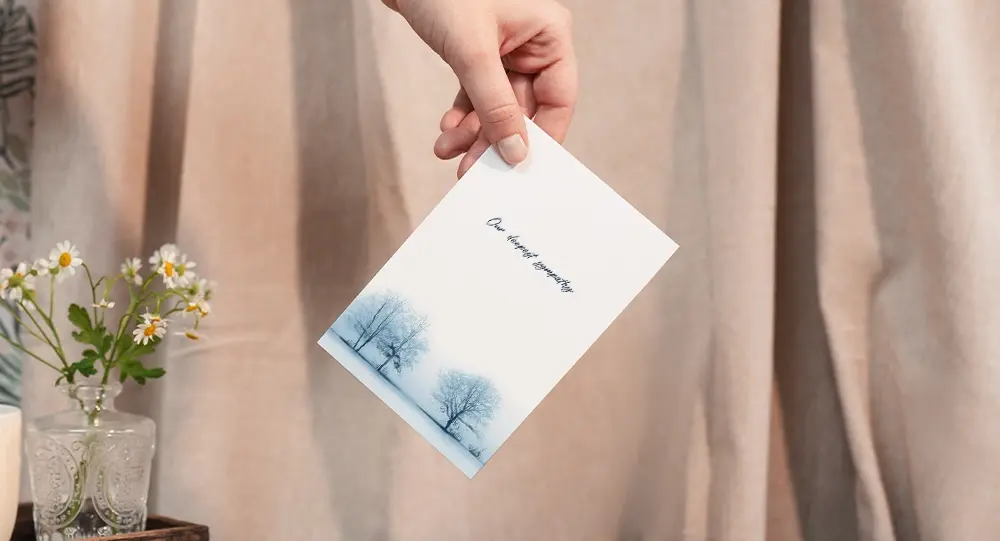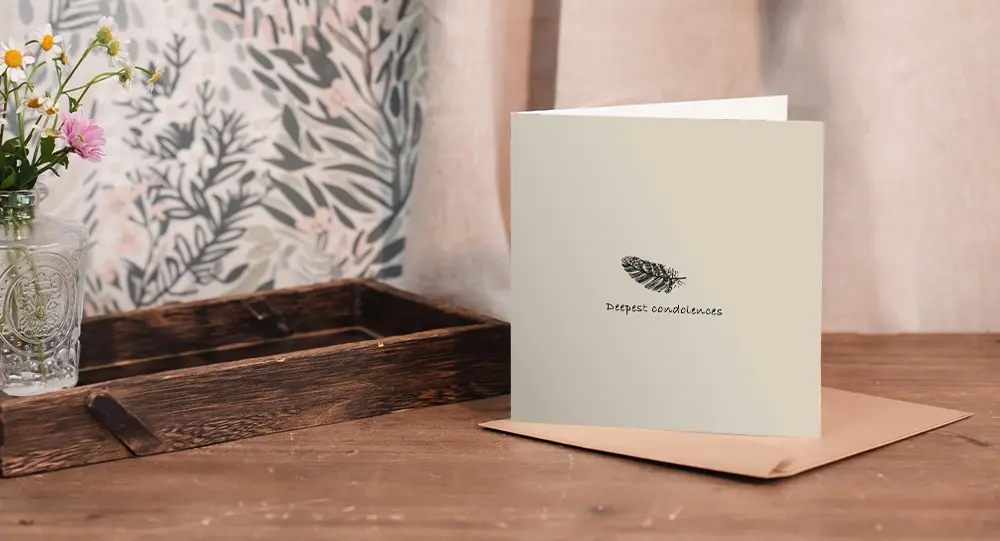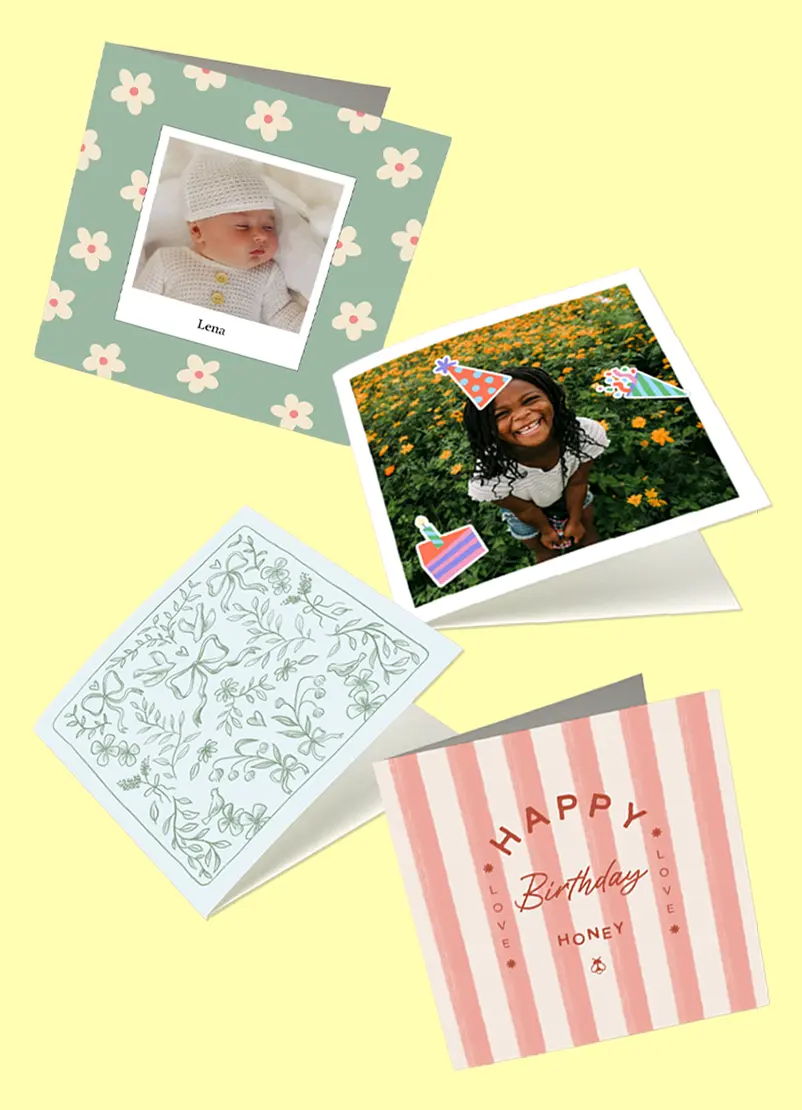


Sympathy Card
Starting from €2.70
Send your sympathy card with just 1 click
Show your support with a personalised card:
- dimensions: classic card (15×10 cm), square or double card (14×14 cm); 📐
- fully customisable; ✏️
- envelope included; 💌
- printed in France. 🇫🇷
How does it work?


Choose a design
that reflects the memory of the departed

Add photos
and share your condolences

Select a recipient
write their address precisely

The rest is on us
(envelope, printing & shipping fees)
Our selection of designs
How to create a condolences card with Fizzer
They say yes to Fizzer
With over 2 million loyal Fizzer users and over 3 million cards sent yearly, all that’s missing is you!
4,8/5

Based on 81456 reviews

Everything you need to know about the sympathy card
Need help? Have a question? The Fizzer team answers within 24 hours, even on Sundays!
3 tips for writing your sympathy card
In the wake of a bereavement, finding the right words can be challenging.
Here are three tips to help you craft your supportive message.
Quickly send your condolences with our easy-to-use application.
Share your emotions while allowing space for the recipient’s feelings.
Suggest your assistance to loved ones in a straightforward sentence.
Explore our products
How to choose a sympathy card: small guide to help you
When it comes to choosing a sympathy card, the key is to do it from the heart. During such a tough time as dealing with a loss, expressions of sympathy provide vital support to those grieving. Overcoming the death of a loved one is best navigated with a compassionate and understanding support system around them. Thus, it’s essential that the card you choose reflects the genuine feelings you have about this difficult experience.
The message you write will carry a lot of significance. Look for a design that you believe captures the essence of the person who has passed. You might find a card that resonates with the grieving family’s spirit.
We offer a variety of designs, some featuring simple illustrations that convey a sense of dignity and respect. If you want to honour the deceased, consider a card where you can include your own photos. Your choice will always be meaningful, as long as it shows your compassion, features a thoughtful design, and pays appropriate tribute to the loved one who has passed.
Just make sure to explore the “death announcements” or “condolences” categories, so you can avoid images that don’t fit the somber theme.
Personalising your sympathy card: a brief guide
To make your card more intimate and personal, consider adding photos, text, a stamp, or anything else that feels right. While personalising a sympathy card can be more challenging than a standard postcard, it’s certainly achievable with a touch of tact, gentleness, and restraint.
On the front of your card, you might include a supportive phrase such as:
- “My deepest condolences.”
- “Sending you all my support.”
- “You are in my thoughts.”
- “We are thinking of you.”
- “Our heartfelt condolences.”
- “In memory of [deceased’s first name].”
- “We are with you in spirit.”
If you’ve chosen a design that allows for one or more photos, this is a wonderful opportunity to personalise it further. You might add images of the deceased or their family. Just be sure to maintain a sense of sobriety given the circumstances.
On the back of your card, consider adding a personalised stamp. Again, select a discreet image. This could be:
- a photo of the deceased;
- a symbolic image, like a dove or an olive branch;
- a supportive image, such as a heart, a helping hand, or an embrace.
Once you’ve thoughtfully designed and presented your personalised sympathy card, you can move on to crafting your condolence message, which will play a significant role in its personalisation.
Writing a heartfelt message of support on your card: tips
Crafting a condolence message on your card is incredibly important. The words you choose will reflect the emotions you feel, making your expression of sympathy truly meaningful. Condolences are a way to convey your compassion to the grieving family, and your message should demonstrate that you empathise with the difficult experience they are facing.
However, it’s essential to strike a balance and avoid being overly expressive, so your feelings don’t overshadow theirs. In some situations, a brief message may be more appropriate. Always prioritise their pain over your own emotions. Your text should adhere to certain conventions, which you can explore in our dedicated pages. Feel free to draw inspiration from our examples or condolence messages tailored for families.
Appearance of your sympathy card
Fizzer makes this often stressful process much easier for you. Simply head to our app, where you can select your preferred card from a variety of clean and understated designs created by our illustrators. You can choose a card with just an illustration or personalise it with your own photos by clicking on the designated areas.
This will open up your computer or phone’s gallery, allowing you to choose the photo you’d like to include on your card. Once your image is added, click to confirm and move on to writing your message. Here, you can also customise your stamp with a photo of your choice.
When your card is complete, select your recipient(s), and we’ll take care of the rest.
The importance of sending a sympathy card
Your friends or acquaintances are going through a painful time right now. Sending a sympathy card, perhaps along with a phone call or a visit, is a thoughtful and respectful way to show your support. It can help them feel less isolated and remind them that they are not alone in their grief.
What does a condolences card provide?
A condolences card offers comfort to a friend or loved one who has lost someone dear. Grief and sorrow often accompany death, and sending sincere support through a simple card honours the memory of the deceased while expressing your affection for them and their family.
During times of mourning, it’s common to seek out words that resonate with one’s feelings, which can provide significant solace. The grieving process can be lengthy following the loss of a loved one, requiring time and several stages to genuinely “process” the loss. Sending a note of comfort and sharing memories one last time with the departed can be incredibly meaningful.



















